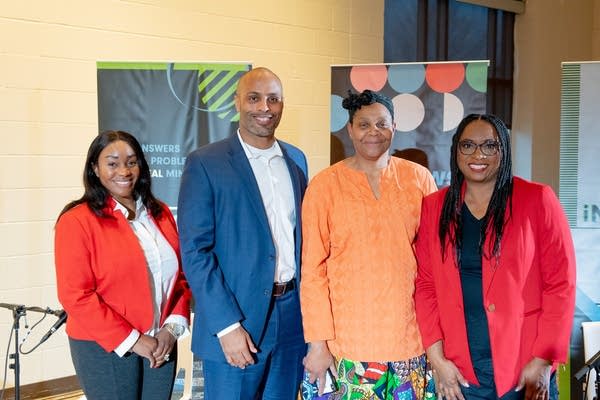How to stop violence before it starts and break the cycle of trauma
Go Deeper.
Create an account or log in to save stories.
Like this?
Thanks for liking this story! We have added it to a list of your favorite stories.
When violence erupts, it creates a shock wave that impacts entire communities. The trauma embeds itself in both victims and perpetrators and, like a virus, often spreads and multiplies. How do we break the cycle?
Last week, MPR News host Angela Davis sat down with community leaders for a live In Focus conversation at Arlington Hills Community Center in St. Paul. How does violent crime wound us, and how can we allow those wounds to heal? What are some new and creative strategies to protect communities from the contagion of violence?
Listen to or watch the conversation with two members of St. Paul’s newly launched Neighborhood Safety Community Council (NSCC) and the director of a St. Paul nonprofit about the impact of violence on communities and individuals and how to deal with trauma.

Turn Up Your Support
MPR News helps you turn down the noise and build shared understanding. Turn up your support for this public resource and keep trusted journalism accessible to all.
Lynnaia Jacobsen is the NSCC’s manager. She talked about the Office of Neighborhood Safety’s origins, the work it does for the St. Paul community, and how important it is to hear and acknowledge pain.
“One of the things that we are focusing on now is wraparound services. They are continuous services that people need in order to continue navigating life after a traumatic experience, which is, particularly at this moment, gun violence. People need information on services with court, people need shelter, some people lose their benefits because they have to relocate right away. These are services that are offered, that a lot of people don't know about in order to keep them going on with their daily life while they're grieving or while they're trying to navigate away from their current situation with violence.”
Isaac Russell is the NSCC’s chair and the director of public policy at the Center for Economic Inclusion in St. Paul. He talked about challenging experiences in his own childhood, what he hears from communities in St. Paul experiencing violence, the connection between economic distress and violence, and the barriers to getting the right resources to the right people.
“I grew up everywhere. By the time I was 15, it was about 35 different places where I lived, including homeless shelters —public benefits programs galore is what we relied on. In that sort of environment, that sort of instability,” he said. “Going to school hungry, getting lunch shamed at school and going back to a roach-infested hotel — That is not the environment that allows someone to go be successful, but I had an opportunity where others didn't.”

Darlene Fry is the executive director of Irreducible Grace Foundation, a St. Paul nonprofit focused on creating safe spaces for youth of color. She talked about her organization, how it addresses violence, her experience with people who have had traumatic encounters, and her views on how to break the violence cycle.
“Breaking the cycles is about sharing our story, is about being there with them and letting them know you can be honest when you put the investment in yourself. For me, I see those barriers breaking when they invest in other people. I have young people showing up and they're showing up to do work in the community. They're showing up to teach little kids,” she said about her nonprofit.
“How do you regulate yourself? How do you pull your nervous system down? Because when you're in a situation where other people are deregulated, that's what creates a mob mentality. That's what creates the thing where people want to stand around and watch a fight. But if you have the ability to calm yourself down and make some space in your nervous system, then that helps you to do a different choice and to go a different way.”
Stories from people living it
Before this In Focus, MPR News invited people to share their stories around violence, trauma and healing. In this In Focus, three people shared their testimonies:
You'll listen to Gani Prado-Stevens’s experience learning that his football teammate Deshaun Hill had been shot and killed.
You’ll hear from Muhammad Abdul-Ahad, founder of T.O.U.C.H Outreach, a nonprofit group in Minneapolis doing violence interruption work.
You’ll listen to Connie Rhodes, the executive director of Restoration Incorporated, a Minneapolis faith-based group working on youth development and healing.
Useful resources
Subscribe to the MPR News with Angela Davis podcast on: Apple Podcasts, Google Podcasts, Spotify or RSS.


